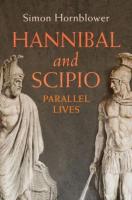
CUP (2024) h/b 528pp £35 (ISBN 9781009453356)
Military historians love to compare great commanders—Pompey and Caesar. Alexander the Great versus Darius, Napoleon against Wellington. They’re measured on strategy, tactics, leadership and effect. Putting them side by side allows us to speculate on what might have been. The rivalry between Hannibal and Scipio was no less important in shaping the future of Europe.
In this comprehensive and absorbing study, the distinguished classicist Simon Hornblower treats us to a very detailed analysis of these two almost contemporary generals (they died in the same year) who dominated the final years of the third century BC. The fate of the two great Mediterranean powers, Rome and Carthage, was decided between them at the battle of Zama (201 BC).
Both came from military families; both won their spurs as senior officers in their twenties; both went on to command huge armies in hostile territory far from home; each survived their decisive battle and returned to domestic politics in their respective countries; both ended their careers in relative ignominy.
Though they met each other and fought each other and later advised competing sides in Rome’s war against the Seleucids, neither wrote a memoir. Direct comparisons are even more difficult because of the absence of literary evidence from the Carthaginian side: all the main sources are Greek and Latin. Even then Plutarch’s Lives of the two Scipios are lost so we rely on Polybius and Livy for the earliest comparisons of the two men.
Hannibal’s campaigning was the most dramatic. Taking over from his father in Iberia, his sacking of Saguntum (219 BC) near Valencia triggered the 2nd Punic War. He then followed up by crossing the Alps and invading Italy itself. For 17 years he terrorised the Republic, laying waste much of the south and detaching key cities from their alliance with Rome. Successive victories at Ticinus River, Trebia, Trasimene and finally Cannae (216 BC) caused panic in the capital. Had he been able to press home his advantage, Rome might never have had its empire.
Scipio was a young military tribune at the disaster of Cannae before being appointed to Iberia where his father and uncle were already serving. After they were killed, he took command. In a four-year campaign with better trained troops and tactics, he liberated Iberia for Rome, capturing Cartagena and winning the crucial battle of Ilipa near Seville (206 BC). Denied a formal triumph he was elected consul for 205 BC aged just 30. He then crossed from Sicily to Africa in order to draw Hannibal back from Italy into Africa, defeating him finally at the battle of Zama (201 BC) in modern Tunisia.
When they clashed at Zama, it was Scipio who prevailed despite Hannibal’s elephants and his larger numbers. Hannibal himself survived but retreated to Carthage to accept Roman terms. After Zama both their careers declined. Scipio the victor enjoyed a triumph and was elected censor (head of the senate) in 199 BC but appears to have made few speeches or otherwise intervened in politics. Hannibal spent nine years in Carthage after his defeat: he too held senior public office but failed to carry his key reforms and fled eastwards.
When the two great opponents finally met, at Ephesus in 193 BC, there was much mutual flattery before they parted to advise each side in the Roman-Seleucid war, Scipio guiding his younger brother Lucius, Hannibal advising Antiochus. In the end neither died in battle. After the Roman victory at Magnesia (190 BC) Hannibal evaded capture for a while in the east but took poison rather than surrender. Scipio simply retired after suffering further political attacks in the senate.
Both were tough commanders, popular with their troops but ruthless in enforcing discipline. Hannibal in Iberia was at first the master, Scipio his fast-learning pupil. Both were military reformers, improving army training and battle tactics, deploying new techniques where necessary to overcame numerical inferiority. Each had to contend with over-stretched supply lines—Hannibal in northern and southern Italy, Scipio in Iberia and Sicily. Without command of the sea or a captured port, Hannibal had the bigger challenge: his army was forced to live off the land and failed to win local hearts and minds in Campania.
H. leaves no stone unturned in weighing every possible element of comparison: family background, religious beliefs, exposure to Greek culture, their relative political failings. But what he makes clear is how much the two men had in common: they fought and thought strategically, from one end of the Mediterranean to the other. In military terms they were perhaps the first modern commanders, paying as much attention to training, logistics and combined arms as to sheer mass of numbers. Both turned out to be better soldiers than politicians.
H. ends with their legacies. Had Hannibal not over-reached in Italy, Europe’s future would have been Carthaginian: instead, his defeat at Zama foreshadowed Rome’s eventual triumph. Hannibal, therefore, gets the better press: he was the romantic loser, the might-have-been, the foreign avenger foreseen by Dido. Scipio by contrast was the skilful but dutiful saviour of the Republic: unlike some of his successor generals he resisted the temptation to use his great victory to seize political power. They were indeed well-matched.
Sir Michael Fallon (Former Defence Secretary)
Founder of the Parliamentary Group for Classics
